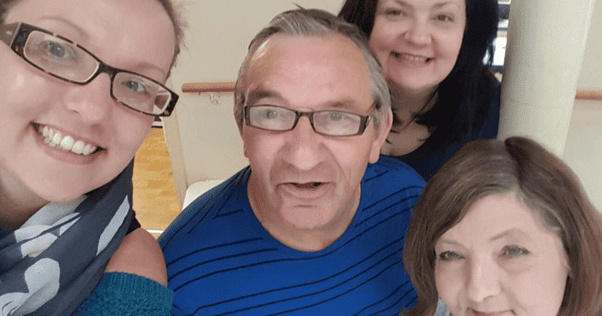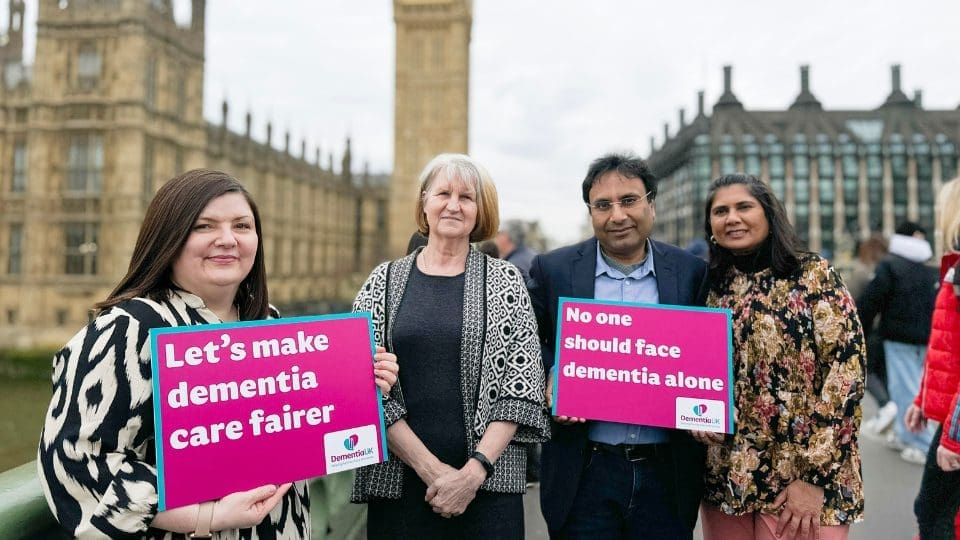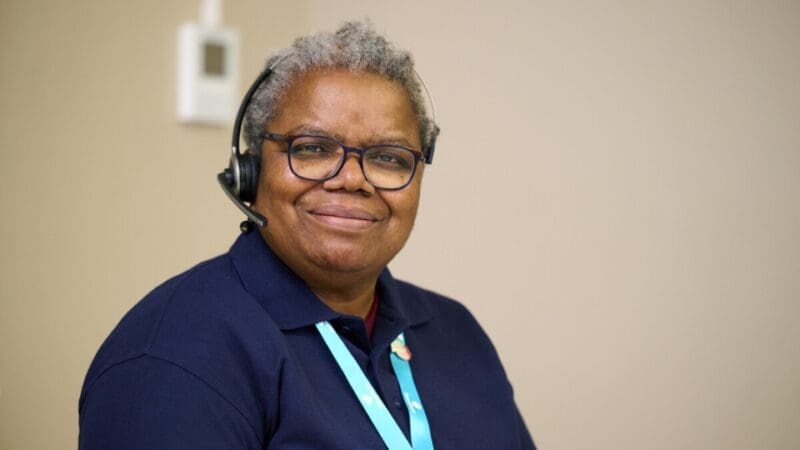
Dad was diagnosed with young onset vascular dementia following a stroke in 2005. He was only 54 when he was diagnosed and lived well with dementia for many years. He was a joiner by trade and was always very active, even after his diagnosis.
However, as Dad’s dementia progressed, it took away his plans for retirement and he wasn’t able to be the Grandad he would have wanted to be to his grandchildren, Leland and Harrison.
Dad couldn’t remember that Mum had passed away
In 2015 my mum, Kath, was diagnosed with terminal cancer. Dad went into emergency respite care – with Mum unwell, we were unable to care for him at home. That was okay for a while but wasn’t sustainable as a long-term placement. From that point on, we tried Dad in a number of care homes, but none of them met his needs.
The care homes were for adults with mental health issues and were not tailored for people living with dementia. Dad was still young and active, but would occasionally have emotional outbursts. He couldn’t understand that Mum was ill and got really upset that she wasn’t visiting him.
Mum passed away in December 2016 and that’s when Dad’s behaviour really escalated. Every time we went to see him, he would ask where Mum was. He couldn’t remember that she had died. I know that sometimes it is best to accept the reality of the person living with dementia, but I couldn’t lie to him about Mum – he had been married to her for 42 years. I had to break the news that she had died every time we went to visit. Dad would become very upset and sometimes aggressive – it was really hard.
The whole process was long, scary and impersonal
At that point, the social worker suggested that we apply for NHS continuing healthcare funding (CHC) to cover the cost of moving Dad into a specialist dementia care home. But the whole process was long, scary and impersonal. I had just lost my mum, and now had to make decisions for my dad.
It was a ‘one size fits all’ approach, which didn’t take into account the unique needs of a person living with dementia. It focused more on physical need, whereas Dad had many cognitive and behavioural needs. The whole process needs to be more tailored.
The assessment was really overwhelming. I cried the whole way through the meeting with the assessors; I felt like I was being interviewed and was scared that if I said something wrong, we wouldn’t get the funding. It was literally a tick box exercise – it felt like Dad was just a number.
It feels like a business decision
We did get granted CHC funding, which I know is rare. But even then, it was up to the assessors to decide where Dad was cared for. It feels like a business decision – you have to do what you’re told.
Dad was a proud man from York; it was part of his identity. As his dementia advanced, he couldn’t remember what he’d had for breakfast, but he could still direct you around York. It was important for us all that he stayed close to the city. We knew he wouldn’t be around forever and wanted to spend as much time with him whilst we still could.
The CHC assessors suggested placing Dad in a care home 40 miles away from his home and family. It was the cheaper option, but my sister couldn’t get there to see him. I would have had to travel every week and stay overnight to see him whilst working full-time. This showed how little the assessors understood about dementia.
We appealed the decision and Dad was placed in a care home nearer by, in Harrogate. It felt like a win, but it was additional stress that we just didn’t need at the time. It’s so important to advocate for your family member the whole way through the CHC process.
A dementia specialist should be present at the assessment
As we approached the point where we needed to reapply for CHC, we started to feel stressed. The home that Dad was in cost £2,500 per week, and we were worried in case the funding was withdrawn. In the end, Dad passed away just before we had to reapply, and while I miss him terribly, I was thankful that we didn’t have to go through the process more than once.
I think the CHC process needs to consider the bigger picture and unique needs of people living with dementia, particularly those who are younger. A dementia specialist should be present at the assessment to give assessors an understanding of the condition and the needs of people living with it.
The assessors also need to look at the wellbeing of the family members who care for the person. Our assessors didn’t understand dementia and my dad’s needs, which made the whole process – from applying for funding to getting Dad into a suitable care home – so much more stressful than it should have been. CHC funding needs to be made more accessible for families living with dementia.
We know that dementia care can be fixed. Join us and urge the new Government to transform dementia care so that everyone affected by dementia gets the specialist support they need. Find out more here.



